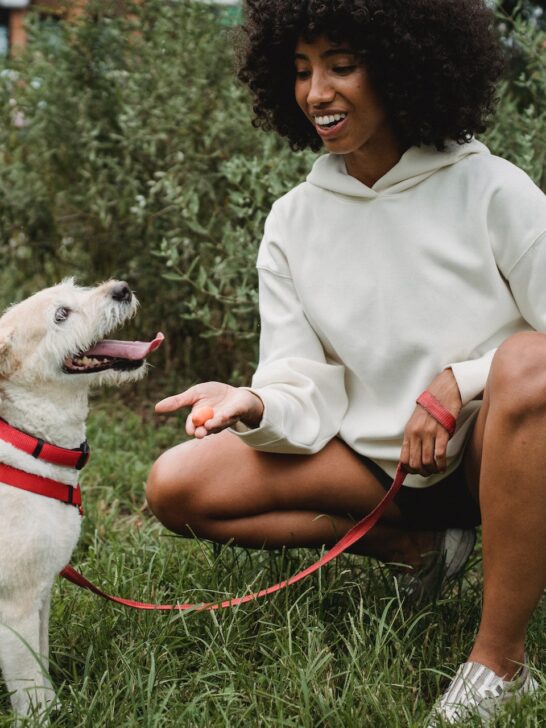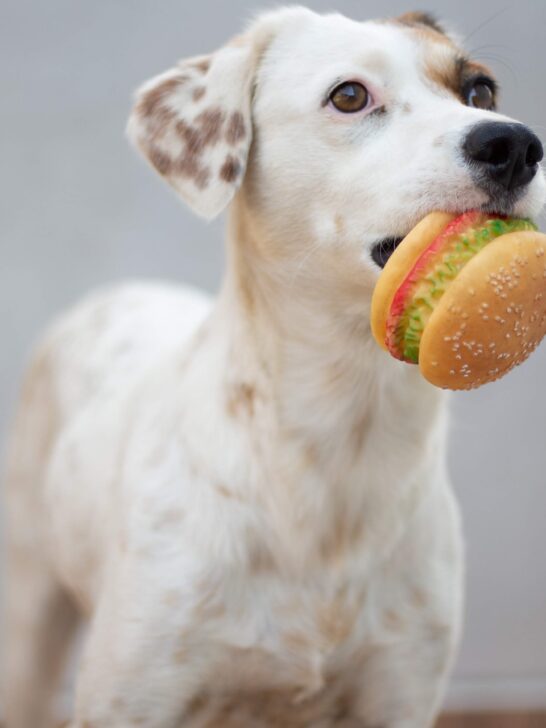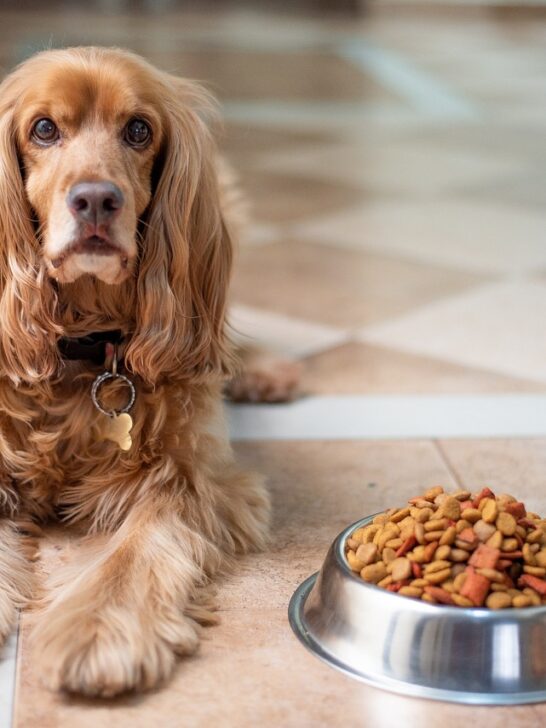How Long Can a German Shepherd Go Without Eating: When to Worry If Your GSD Stops Eating
German Shepherds typically like their food – most GSD owners can attest to this.
Because the GSD is a very people-oriented dog breed, there are far more stories about German Shepherds begging at the table than there are stories about GSDs that are picky eaters.
But there are some circumstances that may cause your dog to stop eating. This can be very worrisome, especially if your dog has always enjoyed their food!
In this article, we take a close look at how long a dog can typically go without eating before the situation becomes an emergency.
We will also offer you tips on how to encourage your dog to start eating again. However, when in doubt, always schedule a visit with your dog’s veterinarian.
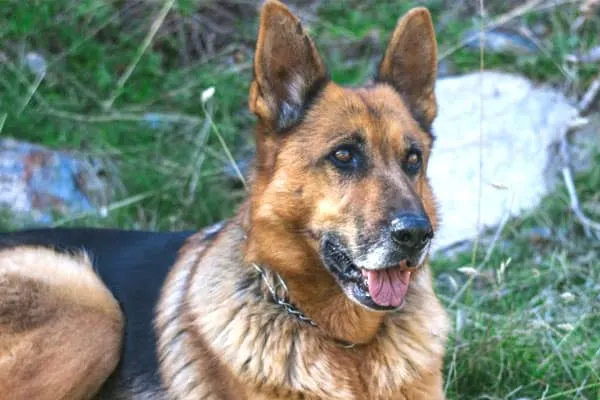
How Long Can a German Shepherd Go Without Eating?
German Shepherd can go for five to seven consecutive days without eating as long as they are still drinking water.
However, if your German Shepherd has refused to drink water for 48 hours, it is time to bring your dog to the emergency veterinary clinic.
This is a potentially life-threatening situation and your dog will need professional medical care, according to Dr. Phillips Animal Hospital.
Tips to Get a Picky German Shepherd to Eat
This YouTube video offers up some helpful hints that may provide extra motivation to your dog to eat.
However, as many of the viewer comments indicate, sometimes when a dog suddenly refuses to eat there may be a deeper health issue going on.
If you have tried everything you can think of and nothing is working, it is time to dig deeper.
Your dog’s veterinarian is your best resource to determine if food allergies or an underlying health issue may be to blame for your dog’s lack of appetite.
Reasons Why a German Shepherd May Stop Eating
As the American Kennel Club (AKC) explains, there are a number of known reasons why a dog may suddenly refuse to eat.
Context can matter a lot when you are trying to figure out what is going on with your dog’s appetite (or lack thereof).
Here are some of the top reasons why a German Shepherd may suddenly stop eating.
You just got your German Shepherd
As Golden State German Shepherd Rescue charity explains, there is often an initial adjustment period when a puppy or adult dog goes to their new forever home.
This is exciting but can also cause anxiety. Anxiety can then cause a dog to not have an appetite or to get an upset stomach for a period of time.

You changed their food
Changes in food can be problematic for dogs. There are certain life transitions, such as when your GSD needs to change from puppy to adult dog food, that can mean you can’t avoid a food change.
But try to do it gradually or your dog may stop eating altogether. This is especially true if your dog has never eaten anything but that food. They may not trust the new food and may refuse to eat it.
You changed their feeding routine
If you have ever noticed how your German Shepherd always knows when it is mealtime without any help from a watch, you already know how much these dogs like their daily routine.
When you make a change to that routine, it might cause them to stop eating until they adjust.
You changed your daily routine
In the same way, whole books have been written about the mysterious way that dogs seem to know when their owners are coming home – long before you actually get home!
If your routine has changed in some big way such as moving to a new home, adding a new family member, adding a pet, losing a pet, or simply a change in working hours, your dog may react by refusing to eat.
This is especially true if the change in your routine means you don’t have as much time to spend with your German Shepherd as you did before. Dogs can stop eating for emotional as well as physical reasons.
They are taking a new medication
There are some canine medications that can cause a dog to feel dizzy, tired, nauseous, or sick to its stomach.
If your dog has recently started a new medication and that seems to coincide with their loss of appetite, it might be the medication’s fault.
They are sick or injured
Dogs may be quite used to living the life of luxury as companion canines, but underneath they still have their wild instinct that says they need to hide any sign of weakness.
Your dog may in fact be injured or sick and the lack of appetite is the only outward sign you get that anything is wrong.
The food isn’t good
If you are used to buying big bags of dog food in bulk, you may not be quite as used to checking the sell-by dates. Stale food won’t taste as good and your dog may not want to eat it.
This can be especially pertinent if you just ordered a new bag of food and your dog suddenly stops eating. The food might not be good. It might be stale or compromised in some way.
It is too hot or cold
As Care points out, another less obvious reason your dog might not want to eat is that they are overheated or chilly. Adjusting the thermostat might reactivate their appetite.
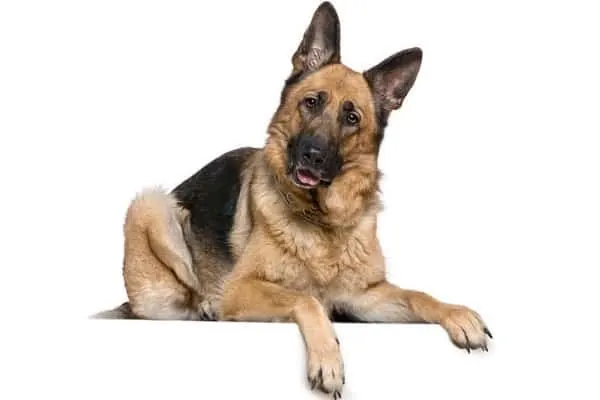
How to Encourage a German Shepherd to Start Eating Again
As you learned here earlier, it is far more urgent to make sure your GSD is drinking water – just 48 hours without drinking constitutes a very real health emergency for your dog!
As PetMD points out, it can be a natural response to illness to stop eating.
People do it and dogs also do it. There can be a benefit to allowing your dog to go for a few days without eating, especially if your GSD has a stomach bug and just needs to get it out of their system.
But after a few days have passed and your dog still doesn’t show any signs of being interested in eating again, it is time to take action.
The first step should always be to consult your dog’s veterinarian.
You want guidance on what to feed and how much to feed, especially if your GSD has any known food allergies or health issues that may be impacted by diet.
Here are some additional things you can try as long as your veterinarian gives their blessing.
Warm up the food
If your dog eats mainly dry food, try moistening it with broth or water and warming it up a bit. The scent might rekindle your dog’s interest in dinner.
Add a tasty topper
You might need to be careful here if your German Shepherd has any signs of food allergies, but you can try nut butter, crumbled dog treats, some cooked egg, bone broth, wet dog food, and other treat toppers to see if your dog will eat them.
Switch out the food brand
As long as your dog doesn’t have a history of refusing to eat during a food change, you might try simply changing to a different food brand your dog likes better.
Stop feeding extra treats or table food
It is very easy to get into the habit of feeding your German Shepherd treats during training or to sneak a few scraps off your plate into your dog’s mouth under the table at dinner.
But this can backfire big time if your dog decides they like your food or the treats better than their regular dog food.
To get your dog to eat their own food again, you may have to first stop feeding the treats and table food.
Once your dog gets the message that those food sources are gone, they may decide to eat their own food again.
Set a timer on mealtimes
Another creative idea to help a German Shepherd who is healthy otherwise to start eating again is to limit mealtimes.
In other words, only leave the food out for 20 or 30 minutes and then take it away until the next scheduled feeding time.
This will teach your dog that if they don’t get in there and eat, they aren’t going to get anything until the next meal.
Ask your veterinarian for an appetite stimulant
Veterinarians have an array of medications they can prescribe to help stimulate your dog’s appetite, as PetMD explains.
If nothing else you have tried is working, your dog’s veterinarian may want to try an appetite stimulant.
In all this, it will be important to consider your dog’s history and take a look at the bigger picture of your life together to figure out why your GSD won’t eat.
Don’t hesitate to reach out for professional veterinary help.

















